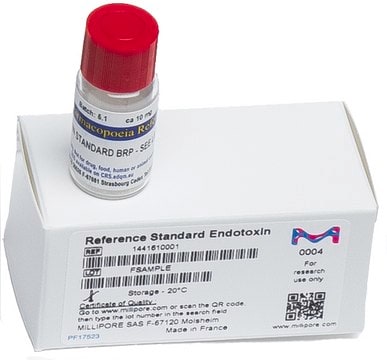V4758
Monoclonal Anti-Vascular Endothelial Growth Factor antibody produced in mouse
clone 26503, purified immunoglobulin, lyophilized powder
Synonym(s):
Anti-VEGF
Sign Into View Organizational & Contract Pricing
All Photos(1)
About This Item
Recommended Products
biological source
mouse
Quality Level
conjugate
unconjugated
antibody form
purified immunoglobulin
antibody product type
primary antibodies
clone
26503, monoclonal
form
lyophilized powder
species reactivity
primate, human
technique(s)
capture ELISA: 2-8 μg/mL
neutralization: suitable
western blot: 1-2 μg/mL
isotype
IgG2b
UniProt accession no.
storage temp.
−20°C
target post-translational modification
unmodified
Gene Information
human ... VEGFA(7422) , VEGFB(7423) , VEGFC(7424)
General description
The antibody will neutralize the biological activity of recombinant human VEGF165. It also recognizes VEGF121.
Immunogen
purified recombinant Sf21-derived human VEGF (165 aa isoform).
Application
Applications in which this antibody has been used successfully, and the associated peer-reviewed papers, are given below.
Western Blotting (1 paper)
Western Blotting (1 paper)
Monoclonal Anti-Vascular Endothelial Growth Factor antibody produced in mouse was used to block the interaction between VEGF and kinase domain receptor in Calf Pulmonary Aortic Endothelial (CPAE) cells.
Biochem/physiol Actions
The vascular endothelial growth factor family consists of five members, VEGF-A to VEGF-E. They play important roles in important role in embryonic vasculogenesis, angiogenesis and homeostasis. The interaction between VEGFs and their respective receptors results in the activation of MAPK, PI3K, PKC, FAK and Src kinase pathways.
Physical form
Lyophilized from a 0.2 μm solution in phosphate buffered saline containing carbohydrates.
Disclaimer
Unless otherwise stated in our catalog or other company documentation accompanying the product(s), our products are intended for research use only and are not to be used for any other purpose, which includes but is not limited to, unauthorized commercial uses, in vitro diagnostic uses, ex vivo or in vivo therapeutic uses or any type of consumption or application to humans or animals.
Not finding the right product?
Try our Product Selector Tool.
Storage Class Code
11 - Combustible Solids
WGK
WGK 3
Flash Point(F)
Not applicable
Flash Point(C)
Not applicable
Personal Protective Equipment
dust mask type N95 (US), Eyeshields, Gloves
Choose from one of the most recent versions:
Already Own This Product?
Find documentation for the products that you have recently purchased in the Document Library.
Dong-Kwon Lim et al.
Biomaterials, 77, 130-138 (2015-11-21)
Vascular endothelial growth factor 165 (VEGF165) is an important extracellular protein involved in pathological angiogenesis in diseases such as cancer, wet age-related macular degeneration (wet-AMD) and retinitis pigmentosa. VEGF165 exists in two different isoforms: the angiogenic VEGF165a, and the anti-angiogenic
R Binétruy-Tournaire et al.
The EMBO journal, 19(7), 1525-1533 (2000-04-04)
Vascular endothelial growth factor (VEGF) binding to the kinase domain receptor (KDR/FLK1 or VEGFR-2) mediates vascularization and tumor-induced angiogenesis. Since there is evidence that KDR plays an important role in tumor angiogenesis, we sought to identify peptides able to block
A Ohwada et al.
Thorax, 58(4), 328-332 (2003-04-02)
Acid induced pneumonitis resulting in acute respiratory distress syndrome (ARDS) is characterised by increased alveolar permeability and accumulation of neutrophils. It is hypothesised that vascular endothelial growth factor (VEGF) is involved in the development of lung oedema. Furthermore, lower levels
Esther Grueso et al.
Journal of virology, 93(19) (2019-07-19)
As many tumor cells synthetize vascular endothelial growth factors (VEGF) that promote neo-vascularization and metastasis, frontline cancer therapies often administer anti-VEGF (α-VEGF) antibodies. To target the oncolytic parvovirus minute virus of mice (MVM) to the tumor vasculature, we studied the
Tania Calvo-López et al.
Frontiers in microbiology, 13, 1063706-1063706 (2023-02-10)
Parvoviruses are promising anticancer and gene therapy agents, but a deep knowledge of the entry process is crucial to exploit their therapeutic potential. We addressed this issue while attempting to retarget the oncolytic parvovirus minute virus of mice (MVMp) to
Our team of scientists has experience in all areas of research including Life Science, Material Science, Chemical Synthesis, Chromatography, Analytical and many others.
Contact Technical Service








